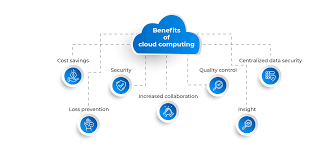Cloud computing has transformed the way businesses and individuals manage data and applications. With its widespread adoption, several key benefits have been recognized. Below, five major advantages of cloud computing are discussed in detail.
1. Cost Efficiency
Significant cost savings are one of the most compelling benefits of cloud computing. Capital expenditure on physical hardware and the associated maintenance costs are reduced drastically. Instead of investing in expensive servers and data centers, organizations can subscribe to a cloud service and pay only for what they use.
Operational expenses are also minimized. The cloud provider is responsible for maintaining the infrastructure, which includes updates, security, and backups. This alleviates the need for an in-house IT team to manage these tasks, further lowering costs. Resources can be scaled up or down based on demand, ensuring that money is not wasted on underutilized hardware.
2. Scalability and Flexibility
Scalability is another significant advantage offered by cloud computing. Resources can be easily scaled to meet the demands of growing businesses. During peak periods, additional resources can be allocated to ensure optimal performance. Conversely, during off-peak times, resources can be scaled back, ensuring cost-effectiveness.
Flexibility is enhanced as well. Applications and services can be accessed from anywhere with an internet connection. This is particularly beneficial for businesses with remote or distributed teams. The cloud environment supports a wide range of devices, from desktops to smartphones, enabling seamless collaboration and productivity regardless of location.
3. Disaster Recovery and Business Continuity
Improved disaster recovery and business continuity are among the most crucial benefits of cloud computing. Data loss due to hardware failure, natural disasters, or cyberattacks can be mitigated through regular backups and data replication, which are typically included in cloud services.
Cloud providers often operate multiple data centers in different geographical locations. This redundancy ensures that if one data center goes offline, data and applications can be quickly restored from another location, minimizing downtime and preventing data loss. The resilience offered by cloud infrastructure is a key factor in ensuring that business operations can continue uninterrupted.
4. Enhanced Security
Enhanced security measures are a notable benefit of cloud computing. Cloud providers invest heavily in security technologies and employ teams of security experts to protect their infrastructure. This level of security is often beyond the reach of individual businesses.
Data encryption, both in transit and at rest, is commonly used to protect sensitive information. Advanced firewalls, intrusion detection systems, and regular security audits are standard practices among cloud providers. Additionally, compliance with industry standards and regulations is maintained, ensuring that data protection requirements are met. These measures collectively provide a more secure environment than many traditional on-premises solutions.
5. Collaboration and Accessibility
Cloud computing greatly enhances collaboration and accessibility. Teams can work on the same projects in real-time, regardless of their physical location. Files and applications are stored centrally in the cloud, allowing team members to access the most up-to-date versions at any time.
Version control issues are eliminated, as changes are synchronized and tracked automatically. This is particularly beneficial for projects requiring input from multiple stakeholders. The ability to share and collaborate on documents seamlessly boosts productivity and efficiency.
Accessibility is also improved. Applications and data can be accessed from any device with an internet connection, providing flexibility to employees and enabling remote work. This adaptability supports a modern, mobile workforce and can lead to higher employee satisfaction and retention.
Conclusion
In conclusion, the major benefits of cloud computing—cost efficiency, scalability and flexibility, improved disaster recovery and business continuity, enhanced security, and better collaboration and accessibility—underscore why many organizations are adopting this technology. The cloud’s ability to provide reliable, secure, and scalable solutions makes it an indispensable tool for modern businesses. As technology continues to evolve, the advantages of cloud computing are expected to grow, further cementing its position as a critical component of the digital landscape.










